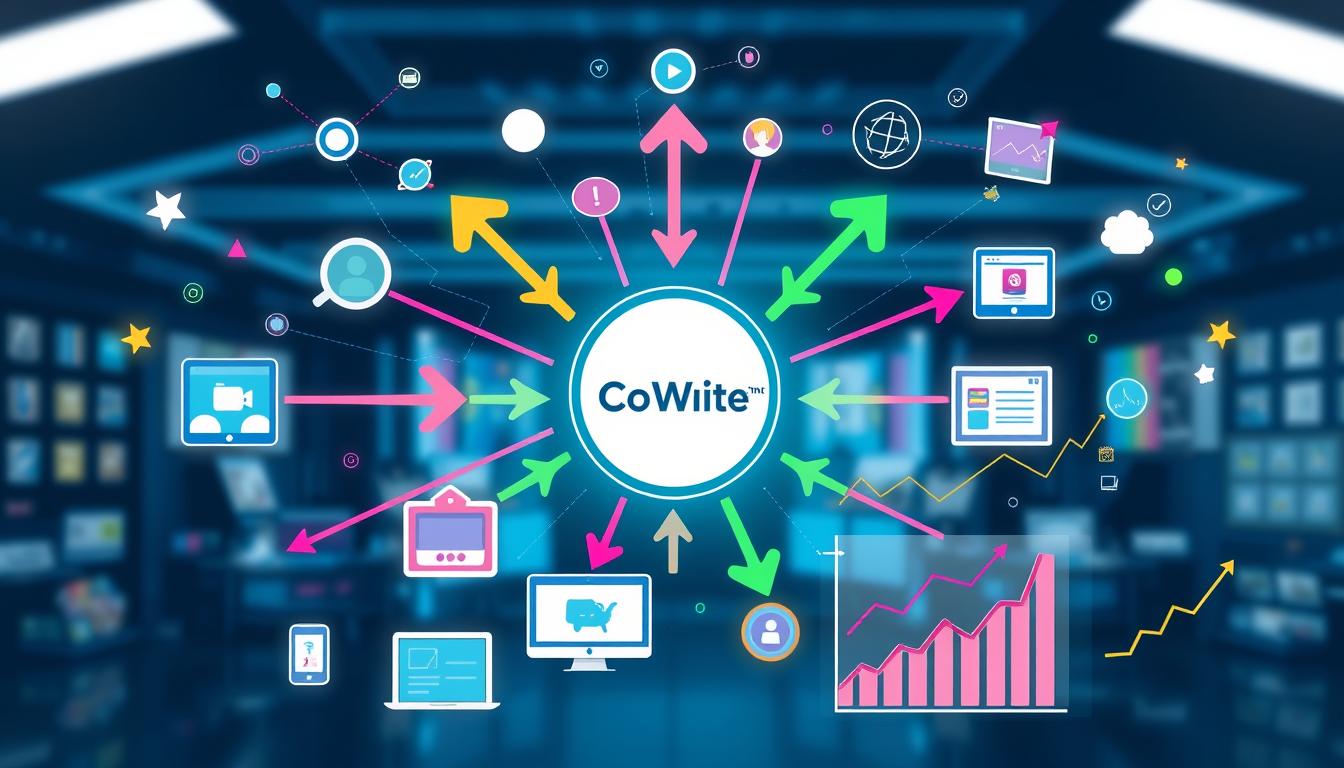In 2025, the world of online shopping is changing fast. Affiliate marketing is a key part of growing online businesses. It’s valued at over $20 billion in 2024 and expected to grow even more by 2031.
Using affiliate partnerships can help you reach more people, build trust, and increase sales. By keeping up with the latest in affiliate marketing, you can beat your rivals and meet your business targets.
Key Takeaways
- Understand the current state of the affiliate marketing industry.
- Learn how to leverage affiliate partnerships for business growth.
- Discover the latest trends and strategies in affiliate marketing.
- Find out how to stay ahead of the competition in the digital marketplace.
- Explore the full power of affiliate marketing for your online business.
Understanding Affiliate Marketing and Its Benefits
To grow your online business, you need to know about affiliate marketing. It’s a way for businesses to grow online by working with affiliates. These affiliates help by sending traffic or sales through special links.
Definition of Affiliate Marketing
Affiliate marketing is a performance-based model. Businesses pay affiliates for their help in driving traffic or sales. It’s cost-effective and can grow a lot, making it great for businesses wanting to be bigger online.
“Affiliate marketing is a form of online marketing that involves promoting products or services from another company and earning commissions on sales or referrals made through your unique affiliate link.” –
Key Components of Affiliate Marketing
The main parts of affiliate marketing are:
- Affiliates who promote products or services
- Businesses or merchants who offer products or services
- Affiliate networks that manage relationships and track performance
- Customers who purchase products or services through affiliate links
These parts work together to help both businesses and affiliates. Businesses get more exposure and sales. Affiliates make money for their work.
Common Affiliate Marketing Models
There are several affiliate marketing models, including:
| Model | Description | Commission Structure |
|---|---|---|
| Pay-per-sale (PPS) | Affiliates earn commissions for each sale made through their referral link. | Percentage of sale amount |
| Pay-per-lead (PPL) | Affiliates earn commissions for generating leads, such as sign-ups or form submissions. | Fixed amount per lead |
| Pay-per-click (PPC) | Affiliates earn commissions for each click on their referral link. | Fixed amount per click |
Knowing these models is key for businesses to use affiliate marketing strategies well. By picking the right model, businesses can make their affiliate programs more profitable.
The Growth of Online Business in2025
As we enter 2025, the online business world is growing fast. This growth is thanks to new tech and how people shop. The e-commerce market is booming, with U.S. affiliate marketing spending expected to hit $11.2 billion in 2025.
Statistics on E-commerce Growth
The numbers on e-commerce growth are impressive. With digital platforms on the rise, businesses are seeing big revenue jumps. Affiliate marketing is key, helping businesses reach more people and boost sales through affiliate partnerships.
Trends Shaping the Online Market
Several trends are shaping the online market in 2025. Influencer marketing is a big deal, with brands teaming up with influencers to connect with specific audiences. Mobile commerce is also growing, as more people shop online using their phones.
- Increased use of AI-driven solutions for personalized marketing
- Growth of social commerce through platforms like Instagram and Facebook
- Rise of voice search and its impact on SEO strategies
Importance of Digital Presence
Having a strong online presence is key for businesses in 2025. This means having a user-friendly website, active social media, and good content marketing. A strong digital presence boosts brand visibility and builds trust with customers.
To succeed, businesses need to create content that speaks to their audience. Using SEO best practices is also vital to make sure their online presence is seen by more people.
How Affiliates Increase Brand Exposure
Affiliates can greatly improve your brand’s online presence and trustworthiness. They help businesses reach more people and connect with possible customers better. This way, brands can grow their market and attract new customers.
Reach a Wider Audience
Affiliates help brands get in front of more people by promoting products in specific communities. This focused effort means your message goes to those who are most likely to be interested. For example, a beauty brand might work with a famous beauty blogger to showcase their new skincare line. This reaches thousands of people who love beauty products.
Here’s a table showing how affiliates help different industries:
| Industry | Affiliate Marketing Benefit | Impact on Brand Exposure |
|---|---|---|
| Fashion | Increased product visibility through influencer partnerships | Higher brand recognition among fashion-conscious consumers |
| Electronics | Targeted promotions through tech review websites | Enhanced credibility and trust among tech enthusiasts |
| Health & Wellness | Promotion through fitness and nutrition influencers | Increased brand loyalty and customer engagement |
Enhanced Social Proof
Affiliates act as social proof by endorsing products. This makes people more likely to trust and buy from your brand. When an affiliate promotes a product, it feels like a personal suggestion. This can be very convincing.
Experts say, “affiliate marketing is not just about driving sales; it’s about building relationships and trust with your audience.” You can learn more about effective affiliate marketing strategies in this 
Engaging Potencial Customers
It’s important to engage people who might buy from you. Affiliates do this by making content that speaks to their audience. This could be reviews, tutorials, or testimonials. They grab the attention of possible customers and encourage them to act.
By using these strategies, businesses can improve their brand’s exposure and grow through affiliate marketing. When using affiliates, picking the right partners and building good relationships is key to success.
Building Affiliate Relationships
Building strong connections with your affiliates is key to a successful affiliate marketing campaign. This partnership can drive sales and boost your brand’s visibility. Affiliate networks play a big role in connecting businesses with the right affiliates.

Finding the Right Affiliates
Finding the right affiliates is essential for your program’s success. You need to find those whose audience matches your brand and products. Researching, analyzing their content, and understanding their audience is important.
By partnering with the right affiliates, you can promote your products to the right people. This increases the chance of sales.
To improve your affiliate program optimization, look at the affiliate’s niche, content quality, and engagement. Use affiliate network platforms to find and check out affiliates.
Establishing Trust and Communication
After finding the right affiliates, building trust and communication is key. Regular updates, timely payments, and quick support are important. Also, give them the tools and info they need to promote your products well.
Keep in touch with your affiliates through newsletters, webinars, and personal meetings. This keeps them engaged and loyal to your brand.
Structuring Commission Models
A good commission model motivates your affiliates. You need to offer competitive commissions without losing money. Consider a performance-based marketing model that rewards affiliates for their results.
When setting up your commission structure, think about the product’s price, the affiliate’s niche, and competition. Tiered commissions or bonuses for top performers can motivate them to work harder.
The Role of Content Marketing in Affiliate Success
In affiliate marketing, content is key. It drives engagement and sales. As an affiliate, making valuable content is essential to attract and keep your audience.
Types of Content That Drive Sales
Affiliates use different content types to sell. These include product reviews, tutorials, and blog posts. Each type has its own purpose and can match your audience’s likes.
- Product Reviews: Detailed reviews help people decide, leading to more sales.
- Tutorials: Tutorials show how to use products or services, helping users.
- Blog Posts: Blog posts educate on niche topics, showing your expertise.
| Content Type | Purpose | Benefits |
|---|---|---|
| Product Reviews | Inform customers | Builds trust and boosts sales |
| Tutorials | Educate and show how to use | Improves user experience |
| Blog Posts | Establish authority and educate | Boosts SEO and attracts traffic |
SEO Best Practices for Affiliate Content
SEO is key for more visibility and traffic. Use relevant keywords, optimize meta tags, and make sure your content is mobile-friendly.
These practices help your content rank better on search engines. This means more clicks and possibly more sales.

Utilizing Visual Media
Visuals like images and videos make your content better. They make complex ideas easier to understand. This makes your content more engaging and shareable.
By using high-quality visuals with great content, you create a story that connects with your audience. This can lead to more affiliate sales.
Leveraging Social Media for Affiliate Marketing
Social media is key in affiliate marketing. Platforms like Instagram, TikTok, and YouTube help affiliates share content. They can reach more people and work with influencers to boost sales.

Effective Platforms for Engagement
Each social media platform has its own strengths. Instagram is great for showing off products. TikTok is perfect for short, fun videos. YouTube is ideal for detailed reviews and tutorials.
For example, beauty affiliates can use Instagram’s “Shopping” feature. This makes it easy for followers to buy products. Tech affiliates can create detailed reviews on YouTube, building trust with their audience.
Crafting Shareable Content
Creating content that people want to share is important. You need to know what your audience likes, make high-quality content, and use clear calls-to-action. This helps you reach more people and get more shares.
A digital marketing expert says, “The secret to success on social media is making content that’s engaging and valuable.” Focus on the product’s benefits, share your own experiences, and use stories to connect with your audience.
Influencer Partnerships
Working with influencers can help you grow your audience and credibility. Choose influencers who are passionate about your niche and have the right audience for you. It’s important to find influencers whose values match yours.
For more tips on making money with affiliate marketing, check out this guide for a detailed look.
The Impact of Data Analytics on Affiliate Strategy
Understanding data analytics is key for better affiliate marketing. It helps you make your affiliate programs more effective. With data analytics, you get insights into how well your programs are doing.

Importance of Tracking Performance
Tracking how well your affiliate marketing does is very important. It lets you see what’s working and what’s not. You can then change your strategies to get better results.
Good tracking tools give you detailed info on your affiliates’ performance. You’ll know which channels are best and which affiliates are making the most money. For more tips on improving your affiliate marketing, check out affiliate marketing strategies.
Tools for Analyzing Affiliate Success
Many tools can help you understand your affiliate marketing success. These tools range from simple analytics to advanced platforms. Look for tools that track data in real-time and offer detailed reports.
With the right tools, you can understand your marketing better. This leads to smarter marketing and more money online.
Making Data-Driven Adjustments
Changing your strategies based on data is key to improving. By looking at your campaign data, you can find trends and solve problems. This makes your affiliate program better over time.
To make good changes, you need a flexible plan. Stay ready to adjust to new market trends and customer behaviors. This way, you can make your affiliate marketing more effective.
Adapting to Changes in Consumer Behavior
In today’s fast-paced digital world, it’s vital to keep up with consumer changes. The pandemic has sped up these shifts, making it key for businesses to understand and act on them.
Understanding Post-Pandemic Shopping Habits
The pandemic has changed how people shop, with more online purchases and a desire for personalized experiences. Now, consumers want flexibility, convenience, and interactions that feel tailored to them.
Here are some trends to keep in mind:
- More demand for contactless payments and deliveries
- Focus on health and wellness products
- More social commerce on platforms like Instagram and Facebook
Importance of Personalization
Personalization is now key to keeping customers happy and loyal. By using data analytics and AI, businesses can give tailored recommendations and improve customer experiences.
| Personalization Strategies | Benefits |
|---|---|
| Using customer data for targeted marketing | Higher conversion rates and loyalty |
| Implementing AI-driven product recommendations | Better customer experience and sales |
Mobile Commerce Trends
Mobile commerce is on the rise, thanks to more people using smartphones and websites that work well on mobile. Businesses need to make their online presence mobile-friendly to reach this growing market.
Here are some key trends:
- Mobile payment systems like Apple Pay and Google Pay
- Voice search optimization for better findability
- Mobile-only deals and promotions to boost engagement
To keep up with these changes, businesses should focus on understanding shopping habits, personalization, and mobile commerce. For help with these strategies, consider reaching out to experts who can guide you through the digital landscape.
Legal and Ethical Considerations in Affiliate Marketing
Affiliate marketing is growing fast. Businesses must follow strict rules to stay honest and fair. This ensures marketing is transparent and trustworthy.
Compliance with FTC Guidelines
The Federal Trade Commission (FTC) sets rules for affiliate marketing. It’s key to follow these to keep your marketing honest. You must tell your audience when you’re working with a product or service.
Key FTC Requirements:
- Clear and conspicuous disclosure of affiliate relationships
- Disclosure should be hard to miss and easily understood
- Use of clear language, avoiding jargon or technical terms
Transparency with Audiences
Being open with your audience is key to trust. Telling them about your affiliate partnerships is not just right, it’s smart. It makes your audience more loyal and informed.
Best Practices for Transparency:
- Clearly label affiliate links and content
- Provide honest reviews and feedback
- Be open about the benefits and limitations of products or services
Best Practices for Ethical Marketing
Good marketing is more than following rules. It’s about being honest and respectful to your audience. This builds strong partnerships and a good reputation for your brand.
Strategies for Ethical Marketing:
- Promote products or services that align with your audience’s interests and needs
- Avoid deceptive or misleading marketing tactics
- Foster a community based on trust and mutual respect
Focus on legal rules and ethics to create a reliable affiliate marketing program. This benefits your business and your audience.
Future Predictions for Affiliate Marketing
New technologies and trends will change affiliate marketing a lot in the next few years. It’s key for companies to keep up to get the most from their affiliate marketing.
Emerging Technologies Shaping the Future
Artificial Intelligence (AI) and Machine Learning (ML) are making big changes in affiliate marketing. AI tools can make affiliate programs better by understanding what people want, making content personal, and doing tasks automatically.
The use of voice search is also growing. As more people use voice-activated devices, affiliates need to make their content work for voice searches. These searches are often longer and more conversational.
Trends to Watch in Affiliate Marketing
Several trends will shape affiliate marketing’s future. These include:
- More focus on influencer partnerships and content collaborations.
- Video content, like short videos, becoming more important.
- Affiliate marketing on social media platforms growing.
- More attention to data privacy and compliance.
Potential Challenges Ahead
There are also challenges that businesses need to get ready for. These include:
| Challenge | Description | Potential Impact |
|---|---|---|
| Increased Competition | More companies joining affiliate marketing. | Higher costs for programs, lower returns. |
| Regulatory Changes | New laws on data privacy and ads. | More costs for following rules, fines if not. |
| Technological Disruptions | Fast tech changes affecting how people act. | Need to keep up with new tech, invest in it. |
By knowing these trends and challenges, businesses can better handle the changing affiliate marketing world. They can make their strategies work better for success.
Case Studies of Successful Affiliate Marketing
Looking at successful affiliate marketing campaigns shows us what works. Top brands have grown a lot through affiliate marketing. They offer lessons for anyone starting out. By learning from these stories, businesses can make their own strategies better.
Highlighting Top Brands and Their Strategies
Many big brands have used affiliate marketing to grow. For example, Amazon has a big affiliate program. It lets website owners make money by promoting Amazon products. This has helped Amazon a lot, with a big part of its sales coming from affiliates.
Sephora is another example. They have a good affiliate program with influencers and beauty bloggers. Sephora’s program helps sell more and get more people to know about the brand. Affiliates make money when people buy things through their links.
Lessons Learned from Successful Campaigns
Looking at successful campaigns, we learn a few important things. First, choosing the right affiliates is key. They should match the brand’s values and who they want to reach. Second, making high-quality content is important. It keeps people interested and can lead to sales.
Third, tracking and improving is essential. It helps find what’s working and what’s not. By using these tips, businesses can make their affiliate marketing better and grow.
Key Takeaways for New Affiliates
For new affiliates, knowing what makes a campaign successful is important. Here are some main points:
| Strategy | Description | Benefit |
|---|---|---|
| Choose the Right Affiliates | Partner with affiliates who align with your brand values and target audience. | Increased brand awareness and sales. |
| Create High-Quality Content | Develop content that engages and drives sales. | More customer engagement and sales. |
| Track and Optimize Performance | Watch how affiliates do and make smart choices. | Better return on investment and campaign success. |
By following these tips, new affiliates can make their marketing work better. This can help grow their brand and reach more people.
Conclusion: The Road Ahead for Affiliate Marketing
Affiliate marketing is set to grow even more in the future. It’s great for making money online and improving affiliate programs. To stay ahead, it’s key to know the main strategies for success.
Key Takeaways for Businesses
To boost your online success, build strong ties with affiliates. Use data analytics and keep up with what customers want. This will help you make the most of your affiliate program.
Embracing the Future of Affiliate Marketing
The future of affiliate marketing looks bright, with new chances coming with tech advancements. Stay updated and flexible to grab these chances. For top tips on your affiliate marketing plan, team up with seasoned pros who know the latest trends.
You can reach out to experts on WhatsApp at +44-7822-010953 or +44-7874-424345 to talk about your affiliate marketing needs.



